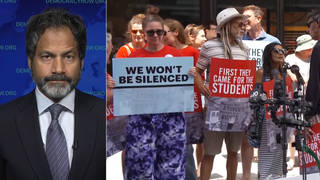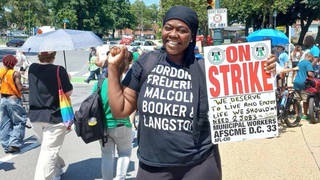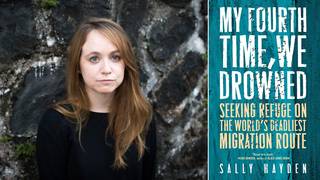
Topics
Guests
- Magda MughrabiAmnesty International’s Libya researcher. She is the main author of their new report, “'Libya is Full of Cruelty': Stories of Abduction, Sexual Violence and Abuse from Migrants and Refugees.”
The European Union is expected to ask the United Nations Security Council today to permit military action against human traffickers operating out of Libya. The U.N. estimates more than 60,000 people have already tried to cross the Mediterranean from Libya into Europe this year. Over 1,800 migrants have died in the attempt, 20 times more than the same period last year. Meanwhile, the European Commission is due to make a proposal that member countries take in refugees under an EU quota system. The European Commission’s migration policy will also propose organizing legal means for migrants to come to Europe so they don’t turn to traffickers. This comes as a new report by Amnesty International reveals how migrants are forced to flee Libya because of “horrific abuse.” The report is based on interviews with refugees and migrants across Libya who face “rape, torture and abductions for ransom by traffickers and smugglers, as well as systematic exploitation by their employers, religious persecution and other abuses by armed groups and criminal gangs.” We are joined by the report’s author, Magda Mughrabi, Libya researcher at Amnesty International.
Transcript
AMY GOODMAN: Today, the European Union is expected to ask the United Nations Security Council to permit military action against human traffickers operating out of Libya. The U.N. estimates more than 60,000 people have already tried to cross the Mediterranean from Libya into Europe this year. Over 1,800 migrants have died in the attempt, 20 times more than the same period last year. Britain is drafting the resolution that would authorize the mission, and today the EU’s chief foreign and security policy coordinator, Federica Mogherini, will brief the Security Council on plans for a Chapter 7 resolution authorizing the use of force.
Meanwhile, the European Commission is due to make a proposal that member countries take in refugees under an EU quota system. The European Commission’s migration policy will also propose organizing legal means for migrants to come to Europe so they don’t turn to traffickers. This policy is expected to be announced Wednesday. Germany is one of the main countries backing quotas. This is German Chancellor Angela Merkel.
CHANCELLOR ANGELA MERKEL: [translated] There are countries which are interested in taking in refugees and which find it right. Germany is among them, and so is Italy, France, Greece, Sweden and Malta. So there’s a large group of countries. And then there are other countries which maybe don’t see this necessity as urgently. They are arguing for a voluntary basis. But I am convinced that it will become clear that especially with the countries confronted with refugees from the Mediterranean, that there will be no alternative to European solidarity to get to a solution.
AMY GOODMAN: This comes as a report released today by Amnesty International reveals how migrants are forced to flee Libya because of, quote, “horrific abuse.” The report is based on interviews with refugees and migrants across Libya who face, quote, “rape, torture and abductions for ransom by traffickers and smugglers, as well as systematic exploitation by their employers, religious persecution and other abuses by armed groups and criminal gangs.” It also finds conditions in Libya migrant detention centers inhumane. As one of the Syrian families interviewed said, quote, “We were facing death in Libya so we thought we might as well face death in trying to get to Italy.”
Well, for more, we go to London to speak with the author of the Amnesty report, titled “'Libya is Full of Cruelty': Stories of Abduction, Sexual Violence and Abuse from Migrants and Refugees.” Magda Mughrabi is a Libya researcher at Amnesty International.
Magda, welcome to Democracy Now! Talk about what you have found.
MAGDA MUGHRABI: Good morning. Well, indeed, the 70 interviews that we’ve conducted with refugees and migrants from all over sub-Saharan Africa, you know, from countries like Nigeria, but also—or Gambia or Ghana, people that come to Libya in order to find better job opportunities, or indeed those that are fleeing conflict and persecution in their countries, in their countries of origin, like Somalia, Sudan, Eritrea, and Syrians, as well, is that these people face widespread abuses at every single stage of their stay in Libya or along the smuggling routes while trying to get into Libya to then seek a better life. For the past few years, it was to find better opportunities in Libya. But now, as the conflicts, the several interconnected armed conflicts that are taking place in Libya, continue and that the country descends into further lawlessness, they find themselves more and more at risk of abuse, so then they decide to put their lives in the hands of smugglers and then continue their journey to Europe in order to find safety there.
So the cases that we’ve documented include, for instance, smugglers keeping groups of migrants and refugees in the desert for several days, up to a month, in certain cases, where they’re not given sufficient quantities of food and not given sufficient quantities of water, forced to sleep outside under—you know, without a blanket and a mattress, all of this in order to coerce them and their families into paying a ransom. We have cases where women, for instance, were subjected to sexual violence by the smugglers or coerced into sex in order to be able to continue their journey. And then, so that’s kind of the welcome to Libya, if you will. Then, along the smuggling route, once they get into major transit hubs along the way, the different migration routes, they may be handed over to criminal—organized criminal groups, which appear to be transnational in nature, where, again, they can be held for days, or up to six months, in some cases, where they are—in order to coerce their families into paying a ransom.
AMY GOODMAN: Tell—where—
MAGDA MUGHRABI: During this time, it’s again the same—
AMY GOODMAN: Where do they come from? Magda, where do they come from, and why are they going to Libya?
MAGDA MUGHRABI: So, as I said, they come from a variety of countries in West Africa, say, from Senegal, from Côte d’Ivoire, from Mali, from Nigeria, from Gambia, but also the Horn of Africa, as well, Somalia, Eritrea, Sudan, as well as Syria, in some cases. And so, every migrant has—or refugee has a different story. In some cases, it is really in order to—you know, for the past few years, there have been, for many, many years, even under Gaddafi, Libya was reliant upon migrant workers. Some of them fled during the 2011 conflict. Some of them stayed. Others came back when things appeared to be on track with the first legislative elections, and there was a form of calm in 2012. But others, you know—and then these people are now leaving. But then there are others that are coming from countries which are conflict-ridden, where they face persecution, such as Eritrea, for instance, or, as well, Syria, where they do not have any—without, you know, neighboring countries to Syria able to absorb such a huge number of refugees. They’re hoping to apply for asylum in Europe, and therefore they do come to Libya. They used to fly into Algeria and then be smuggled, you know, from Algeria into Libya, sometimes via Tunisia, to then board the boats. In some cases, these Syrians have also been there for a number of years. So it’s both established migrant communities and new communities that are using Libya as a transit point in order to seek safety or better opportunities in Europe.
AMY GOODMAN: So, Magda Mughrabi, the European Union is expected to ask the United Nations Security Council to permit military action against human traffickers operating out of Libya. What would this mean? Are you concerned about this?
MAGDA MUGHRABI: Yes. I mean, the proposed plans are very concerning, as they were outlined in the European Council statement from the 23rd of April. One of the measures proposed by the European Union is to take systematic action—or to systematically capture, destroy—identify, capture, destroy vessels before they’re used by smugglers. This is concerning for a number of reasons. For one, military action appears to be disproportionate for, you know, law enforcement issues. I mean, tackling smuggling, which is—in some cases, involved in criminal activities, should be done through law enforcement rather than the use of force. It could be—it is unclear at this stage how the European Union or countries taking part in any such proposed action would differentiate between fishing boats and smugglers’ boats, and any boat could be really used and targeted against that in such a policy.
And it fails also to distinguish between smugglers and traffickers, which our understanding is—you know, whereas people, migrants and refugees, are abused and trafficked in some cases, as I’ve explained, especially along the migration routes running from the south to the north, in the vast majority of cases that we’ve documented, the smuggling—they depart or they use the boats by smugglers after having paid them. While they may be trafficked in some cases, in the majority of cases it is a consensual agreement. It is consensual. And, you know, it’s true that smugglers do expose people to the risk—to risks at sea by overcrowding these boats, by not providing life jackets and so on, and so it results in major tragedies, like the tragedy that we saw a couple of weeks back.
But that being said, also at the moment, with neighboring countries having closed their borders and imposed more stringent visa requirements or travel requirements for third-country nationals, for migrants and refugees, people that do not have passports, because they were confiscated by them either in immigration detention centers in Libya or stolen from them by criminal groups or, you know, militias, they do not meet the visa requirements, and they can’t flee Libya through land borders, so they do effectively have the only—their only way out is really by boat. So, capturing or destroying these boats before they’re being used, I mean, that could be extremely concerning. And our call would be for any such action against smugglers to, A, be done through law enforcement governed by human rights law and also not to lead to any—to migrants and refugees effectively being trapped in Libya by taking away from them one of the only means that they have to—or the only means, for that matter—to flee conflict in Libya, and abuse.
AMY GOODMAN: On Sunday, a New York Times editorial urged against a military response to the migrant crisis, saying, quote, “Military intervention would be a grave mistake. It could sabotage negotiations for a power-sharing deal between Libya’s warring factions, thus killing chances of a political solution to the chaos in Libya. It is, in fact, a cynical strategy, born of Europe’s panic over a tide of foreign migrants.” Do you agree with this, Magda?
MAGDA MUGHRABI: I mean, yes, as The New York Times has pointed out, there are—the United Nations is currently sponsoring a political dialogue process between different warring factions. There are a number of different tracks that are engaged. There was hope that, you know, there may be a political agreement. Libya’s conflict is extremely complicated. One needs to have that in mind. And Libyans are extremely wary of any foreign intervention, even, you know, those that—the so-called internationally recognized, or the internationally recognized government based in Tobruk. So, it could have a potential to derail that process. And our call would be to actually address human rights violations and serious violations of international humanitarian law that are being perpetrated in Libya at this stage, in the context of the current conflict, through the political dialogue rather than through the use of military force. So there is obviously that risk. And as I said, it’s extremely concerning, these measures.
AMY GOODMAN: Magda Mughrabi, I want to thank you for being with us, Amnesty International’s Libya researcher, main author of the report, “'Libya is Full of Cruelty': Stories of Abduction, Sexual Violence and Abuse from Migrants and Refugees.” This is Democracy Now! When we come back, we go to Baltimore. The police union, the attorneys for the police charged in the death of Freddie Gray are calling for the recusal or removal of the chief prosecutor, the state’s attorney for Baltimore. Stay with us.













Media Options